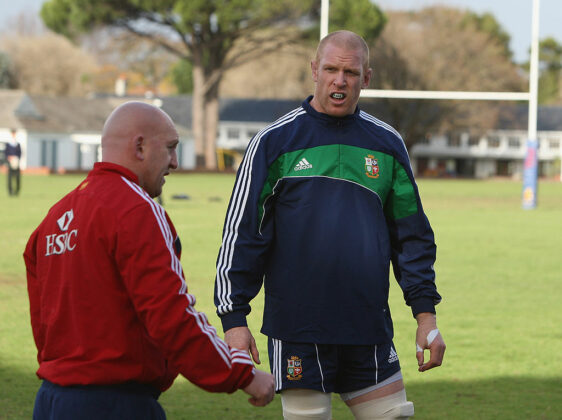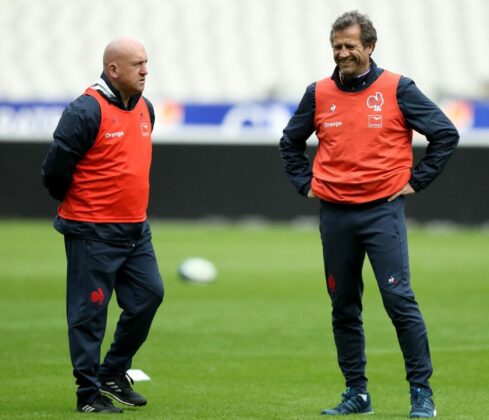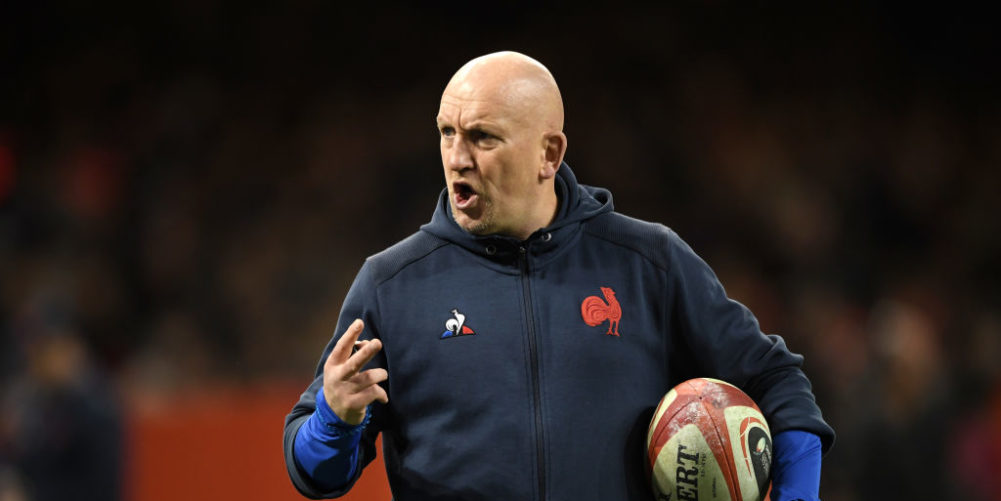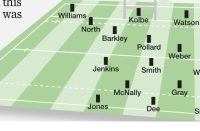SOON after Shaun Edwards had been announced as France defence coach in November he did an interview in Paris with a group of French journalists. When he was asked what he would bring Edwards’ first word was: “Intensity.”
Given a track record as the best defence coach in the world that was no surprise – and he has been true to his word.
France’s extraordinary transformation into a hard-hitting, cohesive tackling line in a matter of weeks, after years of Swiss-cheese holes in defence, fuelled a seemingly unstoppable push for a 2020 Six Nations Grand Slam. When a resounding home win over England was followed by a win over Italy, and then another victory, with Edwards’ recent employers, Wales, the victims in Cardiff, it looked odds-on.
That the Slam was halted in Edinburgh after prop Mohamed Haouas was sent off for a punch is a story that Edwards picks up on later, but for the moment let’s rewind to the interview.
After the word “intensity”, Edwards made the effort to reply to questions in French, and, picking his vocabulary carefully, he made a good fist of it. He talked about double tackles, and winning the ball for the attack.
He said: “J’adore French rugby,” and then wooed his audience by adding (in French), “I always knew one day that I would represent French rugby. Raphael Ibanez was a big reason (that I crossed the Channel), but also the talent and ability in the French system.”
As he spoke the Wigan born-and-bred Rugby League legend threw in a few Gallic shrugs for good measure. It was classy, which is a good way to describe Edwards’ career.
It is underpinned by a record-breaking eight Championships and nine Challenge Cups he won with Wigan in a 467 match club career in the 13-man code. He has gone on since to build a reputation as a driven, innovative defence coach who transforms teams, spending a decade with Wasps and 12 years with Wales before joining France.
Along the way Edwards won three Premiership titles and a Heineken Cup (2004) as Wasps defence/backs coach, and then, after taking over as head coach for three seasons, he won the Anglo Welsh Cup (2006), the Heineken Cup again (2007) and another Premiership title (2008).
During his Wales career Edwards won three Grand Slams (2008, 2012, 2019) in tandem with Warren Gatland, and reached the knockout stages of three World Cups – two semi-finals, and a quarter-final. In those three matches the cumulative total separating Wales from further glory was eight points – a one-point loss to France in the 2011 semis, a three-point loss to South Africa in the 2019 semis, and a four-point loss to South Africa in the 2015 quarters.
Which brings us to what took Edwards to France just five days after he returned with Wales from the World Cup in Japan – a tournament in which they knocked-out the French in the quarter-finals.
When I caught up with him during a video call to the new home he is renting in the village of Canet-en-Rousillon, near Perpignan, Edwards explained that he had been impressed by how much France wanted him, whereas there were complications with Wales and Wigan.
“I wanted to show my commitment – and so I went over, even though I wasn’t being paid. I hadn’t seen much of my little girls, or my son, who is 22 and studying politics at Edinburgh University. In 2019, with all the preparation for the World Cup, and then the tournament itself, I spent 240 days away from home.”
Edwards said that after negotiating multiple contracts during his 38 years as a rugby pro, job security was also a significant factor.
“I was guaranteed a four and a half year deal, and under French law it is very difficult to sack someone (without full compensation), whereas in the UK it’s usually just six month rolling contracts. It means that if you have a terrible run with injuries and the losses pile up, as a coach in the UK you can be out on your ear.”
Edwards says that the commitment is reciprocal, and that the French deal means that he is very unlikely to be available for the 2021 Lions tour to South Africa.
“I have put myself out of that by coming to France, I think. They have put a lot of faith in me, and I have to return that faith.”

Part of doing that successfully is adapting to not just coaching in a new language, but to a different rugby culture – but the plain-speaking Edwards fills-in these potential bolt holes.
He says that the idea of French teams having three course lunches and quaffing vin rouge between training sessions is outdated.
“The image of France not being very professional in a rugby sense is no longer accurate. Fabien Galthie is the boss, and even though we have a bit of banter, he is as keen on good preparation as any top national coach, whether it’s using GPS tracking or making sure that the conditioning, diet and welfare team is as good as possible.”
Edwards says it has been good also to link up with manager Ibanez, the former French hooker and captain he coached at Wasps, and he thanks another former international hooker, forwards coach William Servat, for the support he has had since joining the French camp.
“It’s always great to see someone life Rafa who you know and have spent time with, but I’d also like to mention William Servat. He has done everything from picking me up at the airport to getting me to training, and has been a great help since I arrived.”
As for the communication barrier, Edwards says he has made headway in making himself understood – and to any onlooker the improvements in the French defence speak for themselves.
“I do all my presentations in French and 95 per cent of my coaching in French. I can’t have a detailed conversation, but I know I can get my message over.
“I feel as a coach that it’s often the less you say the better – although if I need to get something specific across William will help me to do so. I prepare the presentations in minute detail, but for me the biggest language in the world is body language.
“If you can read someone else’s body language, and they can see that yours is positive, then you are halfway there.”
So, did Edwards find it strange preparing a French team for the Six Nations that he had just helped Wales knock out of the World Cup?
“Not really. I try to compartmentalise and keep things in their place, and in perspective. Then I had to show my commitment to France, and I did.”
He says he has been given a helping hand because the French players like centre Gael Fickou have been so eager to learn.
“Gael has been absolutely fantastic in leading the guys in defence. Remember how young some of these French players are – Gael seems to have been around a long time, but he’s only 26.
“One of the biggest things for me is that we have a bigger squad than we had with Wales. So, instead of 34 players in the Welsh squad, sometimes we’re up to 42 with France, with young players being brought in to get used to our systems.
Edwards says that he has never forgotten the advice from the revered Australian Rugby League coach, Wayne Bennett, that, ‘you have to remember how young these guys are, and talk their language’.
He adds: “It has helped that Toulouse, which was William Servat’s club, have a similar defensive system to Wales, and that Fabien (Galthie) also applied a similar system in the World Cup – so before the Six Nations I just added a bit of detail, especially in areas attached to the breakdown.
“I understand the French defensive system in the 2019 Six Nations was completely different to what we did this season, but I know some of the reasons why. That’s because when I bumped into Fabien after the World Cup quarter-final to say hard lines, and tell him that the better side lost on the day, his exact words to me were, ‘we cut-and-pasted what Wales were doing defensively’.”

Edwards says his overriding thoughts on his first Six Nations campaign with France are about discipline, being tactically tuned-in, and unfinished business.
“What disappointed me most in the last game against Scotland was that as soon as our bloke was sent off I was thinking we must get a bonus point, slow the game down a bit, but we didn’t manage to. Instead, we were pressing and then conceded an intercept try.
“The big thing with us in the Six Nations was keeping 15 players on the pitch, and with a sin binning and a sending-off in Edinburgh, there wasn’t much chance of that. When you are defending you must be aggressive, but also intelligent.
“We lost the ball 20 times against Scotland – and with 20 turnovers you’re never going to win a game of rugby. It was just a day when the Scots were very good, and I knew it wouldn’t be easy, because, although they lost away to Ireland, it was a great game – and they were ‘jamming’ people in tackles.”
Jamming is when defenders are coming out-to-in to make a tackle, which reduces the carrier’s ability to pass wide, and with the Scots using it very effectively, Edwards says England weathered the storm in Edinburgh in every sense.
“England did very well to win at Murrayfield in those conditions, especially only six days after losing to us in Paris. So, France knew Scotland would be a tough match.”
What is intriguing is that Edwards is prepared to countenance change to the replacement laws, despite the benefits of an eight man bench for defence coaches who want fresh rather than fatigued players in their tackle line.
“What Eddie Jones said recently hit it on the head. To be able to replace 55 per cent of your team in Rugby Union 40 years ago would have been considered insane because one of the most important things about the game is that it is one for all shapes and sizes.
“That has begun to change because some players now only train to play for 25 minutes, meaning they can bulk up. To my mind, stamina and endurance have to be vital ingredients in the game, as well as speed and power.
“Even so, I think the game was fantastic before the (coronavirus) break, and England’s performance in the World Cup semi-final against New Zealand was one of the best of all time. So, let’s not throw that away, either, but try to bring the best parts of the game together.”
Ask Edwards whether France have got what it takes to win the World Cup in 2023 and he refuses to be hostage.
“I’m not someone who can see into the future. We made strides in the Six Nations, and those have to be added onto.
“In the first 20 minutes we are lethal, but in the last 20 minutes we have to get more out of our finishers, because in most games that’s when it is settled.
“That’s why in boxing they talk about the championship rounds, and the last 20 minutes in rugby are similar because you have to dig so deep even though your body is aching, and your lungs are burning.”
Shaun Edwards is a world-renowned expert in not just how to manage intensity in sporting cauldrons, but how to thrive on it – and France are poised to benefit.























